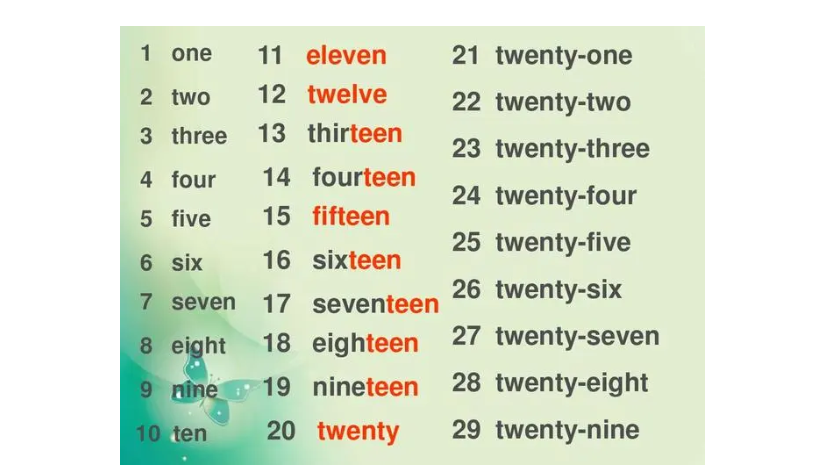The Importance of Numbers: From Eleven to Twenty
In our everyday lives, numbers play a pivotal role. They help us quantify, measure, compare, and navigate the world around us. Among these numbers, eleven to twenty hold a special significance. These numbers not only represent quantities but also embody concepts that are integral to our education, communication, and even culture. In this article, we will explore the importance of these numbers, breaking them down into three main categories: **Mathematical Concept**, **Cultural Significance**, and **Practical Uses**.
1. Mathematical Concept
Understanding numbers from eleven to twenty lays a strong foundation for mathematical concepts.
- **Eleven (11)** and **Twelve (12)**: These numbers introduce us to the idea of two-digit numbers. While eleven is the first two-digit number, twelve serves as a bridge into the teens. This transition demonstrates how numbers build on previous knowledge, allowing students to grasp basic arithmetic operations such as addition and subtraction. For instance, adding one to twelve yields a common number, thirteen (13).
- **Thirteen (13), Fourteen (14), Fifteen (15), Sixteen (16), Seventeen (17), Eighteen (18),** and **Nineteen (19)**: These teen numbers are crucial for teaching properties of addition and subtraction. For example, if students learn that fourteen is simply twelve plus two, they can start to see relationships between adjacent numbers. Such understanding lays the groundwork for more complex mathematical operations, such as multiplication and division.
- **Twenty (20)**: As the first 'round' number in this set, twenty signifies a sense of completeness. It allows learners to measure quantities in groups, paving the way for the concept of place value. Mastery of numbers up to twenty enables students to advance confidently into higher mathematics, such as decimals and fractions.
This journey from eleven to twenty is critical in building a robust numerical literacy that benefits individuals throughout their academic journeys and beyond.
2. Cultural Significance
Each number carries its distinct cultural connotations that extend beyond mere arithmetic.
- **Eleven**: In some cultures, eleven represents a sense of mystery or superstition. For instance, in numerology, it is considered a master number symbolizing intuition and insight.
- **Twelve**: This number is often associated with completeness and cycles, seen in various contexts like the twelve months of the year, twelve zodiac signs, or even twelve hours on a clock. It signifies order and organization in our temporal world.
- **Thirteen**: Known as an unlucky number in Western cultures, thirteen has various mythological implications. Conversely, in some cultures, it symbolizes prosperity and good fortune.
As we progress through the series, numbers like fourteen and fifteen represent transitions—like the transition from childhood to teen玩法e years. Similarly, sixteen signifies driving 玩法e in many places, marking a pivotal moment of independence.
- **Seventeen and Eighteen** both resonate with rites of passage, such as coming-of-age ceremonies. Eighteen is often celebrated as the age of adulthood in various cultures, conferring responsibilities and rights such as voting.
- **Nineteen**: Often associated with the final stages of adolescence, nineteen stands on the threshold of adulthood. It's an age when many young adults are preparing for university or entering the workforce, laden with dreams and aspirations.

- **Twenty**: Entering the twenties is a significant chapter in life, as it usually symbolizes newfound independence and exploration. It marks the period where individuals often start pursuing career paths, higher education, or global travel.
The cultural significance of these numbers showcases how deeply intertwined our understanding of mathematics is with societal norms and expectations.
3. Practical Uses
Numbers from eleven to twenty also find application in countless practical scenarios.
- **Sports**: Numbers like eleven are essential in sports, particularly in team games like soccer, where each team may consist of eleven players. Understanding scores often involves calculations that include numbers up to twenty.
- **Shopping**: When shopping, we often deal with prices that require us to count and make decisions based on our budget. Prices and totals often fall within the eleven to twenty range, making it a practical skill to quickly add or subtract to stay within budget.
- **Cooking**: Recipes frequently call for measurements that can range from eleven to twenty servings. Knowing how to scale a recipe appropriately based on these numbers can save time and resources.
- **Education**: This set of numbers is often the focus in elementary education. Teachers use them to introduce counting techniques, simple equations, and even fundamental geometry, enriching students' comprehension and application of math in real life.
Conclusion
Understanding numbers from eleven to twenty is far more than an arithmetic exercise; it is a vital component of education, culture, and daily life. As we explored, these numbers are foundational in mathematical concepts, embody rich cultural traditions, and have numerous practical applications. By appreciating the significance of these numbers, we not only enhance our numerical literacy but also gain insights into the world we inhabit. Whether you are a student grappling with arithmetic, an adult budgeting for groceries, or someone intrigued by cultural nuances, the journey from eleven to twenty is indeed essential.
云作文原创内容,未经允许不得转载。